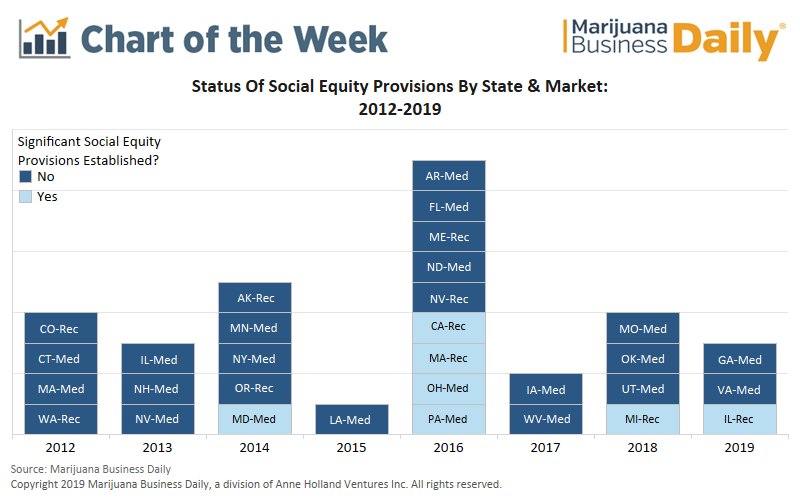Increased attention by lawmakers, regulators and the general public regarding lack of diversity in the cannabis industry prompted a growing number of states to include social equity provisions in their marijuana policies.
Of the 18 states that legalized medical or recreational cannabis sales since 2016, six have taken considerable measures to boost diversity in their marijuana programs.
States that legalized medical and/or adult-use cannabis since 2016 and included social equity provisions are projected to have total annual sales of $12.7 billion in 2022, compared with $4.1 billion combined for those without a social equity program.
Concerns about a lack of social equity and diversity in the cannabis industry have existed since the start of marijuana legalization.
In 2012, when voters in Colorado and Washington state legalized recreational marijuana sales, lawmakers and regulators were concerned about how legalization would impact public health and safety, and, thus, they did little to ensure the opportunities legalization created would be distributed equitably.
However, the landscape has changed significantly in just a few short years – especially on the recreational side of the industry, where every new state, except Maine, has included a social equity initiative.
Maine is still hammering out the details of its adult-use market, so a social equity provision may still be added.
Inadequate measures to address social equity, among other reasons, caused adult-use legalization bills to stall in the New Jersey and New York legislatures.
That stands in stark contrast to Illinois – the first state to legalize recreational marijuana sales via the legislature – where lawmakers passed one of the most progressive marijuana business licensing frameworks in the country.
If successful, Illinois could serve as the blueprint for marijuana programs across the United States.
More data about how social equity efforts are faring across several U.S. markets and an overview of the barriers faced by women and minorities looking to enter the cannabis industry can be found in Marijuana Business Daily’s new report, Women & Minorities in the Cannabis Industry.
Eli McVey can be reached at elim@mjbizdaily.com





